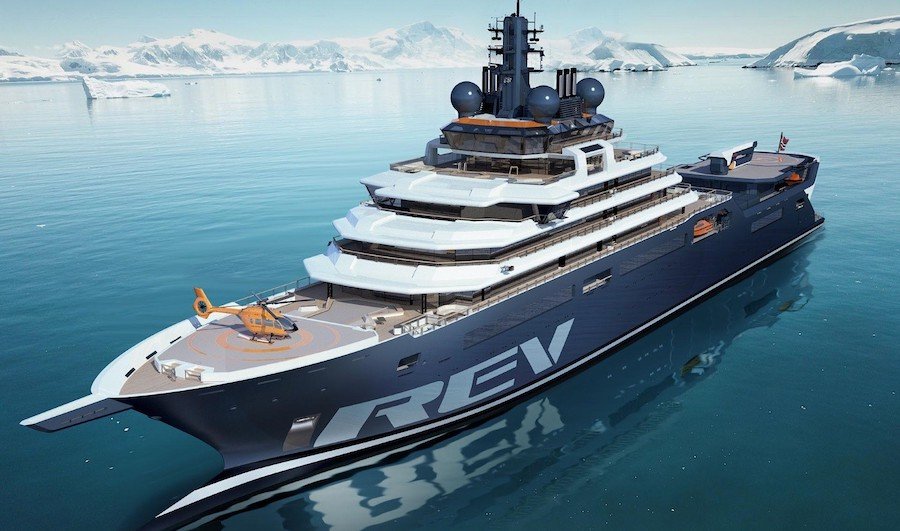REV Ocean Superyacht to Become the World’s Largest, Doubles as Research Ship

REV stands for Research and Expedition Vessel: the ship will sail the oceans of the world, carrying researchers and scientists on missions and expeditions that will help provide concrete solutions to the actual climate and environmental crisis.
Espen Oeino, who designed it, says he took up the project because Røkke had called him up to tell him he wanted a vessel unlike any other in the world: "a yacht with a purpose, a noble purpose." "The whole rhetoric is kind of a showcase of state-of-the-art marine equipment and I think it will be the best equipped scientific ship on the sea. It is probably the most important project we will ever have the chance to work on," Oeino said earlier this year.
At the same time, REV will also double as a charter, which means the richest of the rich will be able to book a trip on it. The best part of it is that most of the money raised by charting the vessel will go towards funding more research and more expeditions.
As of the time of writing, REV is being fitted for research equipment in Norway, and will be making its maiden voyage sometime in 2020, at a date that is to be announced. In August this year, it sailed out of the VARD Tulcea shipyard in Romania after 18 months of construction, en route to Norway, but it's still a work in progress.
This is the sole reason why it's not officially recognized as the world's largest superyacht and the honor still belongs to Azzam, Sheikh Khalifa bin Zayed Al Nahyan's 590 foot luxury vessel. The REV is 600 feet.
Businessman Kjell Inge Røkke commissioned the REV after pledging to give his fortune away, with the goal of building something that would actively help scientists determine the environmental issues most pressing, and concrete ways to tackle them. "An independent scientific committee will evaluate and recommend research projects to pursue, and ensure the highest level of scientific standards and research quality," the official website says.
Once it's finished, it will be fitted with everything from student training facilities to research labs and conference rooms, a fully-equipped hospital with medic on staff, an auditorium and a moon pool, media editing suite, sonar systems and a remote-controlled robot capable of diving 20,000 feet. It will also include 2 helipads, several tenders and work boats, and cranes.
REV includes a high-tech incinerator that allows it to dispose of plastics in an environmentally-friendly manner, without noxious gases and almost no char. This means that it won't have to dock to dispose of plastic waste. It is also fitted to store wastewater for 21 days, and is designed to be fully autonomous for 114 days, carrying between 90 and 106 people on board.
On research missions, REV will carry 60 researchers and 30 crew; during expeditions, it will carry 30 crew, 24 scientists and 36 passengers; used as a charter, it will house 28 passengers and 54 crew. Even as a charter, it will cater to "private individuals, companies and institutions seeking to improve their awareness of the ocean," according to the official website. The focus remains on research and education; this also explains why there are so few details about furnishings and amenities available on board for charter passengers.
Powered by diesel electric engines, REV has an additional 3MW lithium-ion battery pack, sound and vibration reduction systems and heat recovery systems on all main generators. It's built according to the company's "green philosophy" and strives to live by it: it won't just help conduct research and data gathering, but it will do so in a manner that will have the least impact on the environment.
"REV Ocean will strive to fill critical knowledge gaps, develop innovative solutions, and bridge science, business and policy sectors to achieve positive change," organization REV Ocean said last August, when the vessel launched in Romania. "Taking on the role of ocean trailblazers the goal is to create positive, measurable impact; provide a pathway for others to follow and motivate the next generation of ocean leaders. Our vision of ensuring – One Healthy Ocean – forms the core mantra of the whole organization."
Related News


